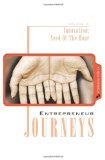Whither Braille
This is interesting:
According to the National Federation of the Blind, only 10 percent of blind children learn braille today, down from 50 percent in the 1950s, and only 10 percent of blind people in America read braille.
I'm not sure I have any opinion on whether it's good, bad, or indifferent - I'm not blind, and I don't know anyone who is. I do know that listening (podcasts) is different than reading - that's why I'm far more interested in e-readers (like the coming iPad) than I am in audiobooks. Is it the same for blind people? It seems they're "voting with their fingers".





Comments
Re: Whither Braille
[Yvonne Thomson] February 4, 2010 19:53:52.276
Ah yes, braille.
Braille is one of those things that's a great idea if it was only practical. I learned it like most of the other totally blindkids of my generation, and the only thing I use it for now are labels or notes if I happen to need to speak in public. Other than that it's computers all the way.
The reason is simple, it's the most impractical thing in the world. Let's first cover hardcopy braille, by which I mean books. Yes, it would be nice to be able to read a novel in braille, but there are a couple of problems with that. First, an average novel length book is 8 to 10 volumes. In other words, 8 to 10 books about the size of an average laptop. Not exactly light reading, right?.
This presumes you can actually *get* the book in braille, which you often can't unless it's at least 20 years old. So you end up having to pay for the book to be brailled *for* you. Not only does this get expensive, but then you end up having to *keep* the thing. the question being, where? If you're a major bookworm, you'd need to buy your own warehouse space. I have vivid memories of studying for the HSC, which are the final highschool exams in my part of Australia. It involved one of my parents going to the school, filling the car up with a mindboggling number of books - my maths book for example was 20 volumes - and then stacking them all over my bedroom for a month since I didn't have the shelf space for them.
I don't actually want to think how many volumes some of those really long fantasy/scifi novels are that are over a thousand printed pages.
So what are we all doing instead? Talking computers and electronic books, basically. This has its own disadvantages. You end up listening to a lot of books read by computer voices. They don't always pronounce things right, they can have realy strange inflections on words, and I doubt the average maths textbook would work very well. On the other hand, you can store an entire library of books on a portable flash drive if you want and carry it wherever you like. The books are usually around if you want them, and if they're not, even though you shouldn't, you can buy them and scan them yourself.
Anyway, this has gotten kind of long and I haven't even gotten into the insane world of braille displays ugh!!! braille embossers and, heaven help us, braille keyboards. Nor the fact that written braille often differs slightly between english speaking countries, and often changes even in your own country every couple of years so that what I'm writing in braille is probably different in little ways from what a student learns now.
Unfortunately, unless civilisation collapses and we end up without electricity or something, the only way for braille uptake is down. And wasn't that more than you ever wanted to know about braille?.